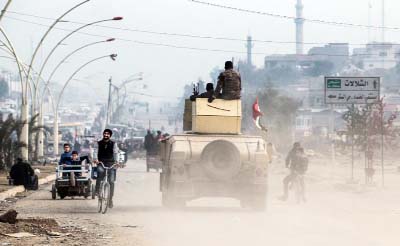
AFP, Mosul :
The Iraqi forces that retook east Mosul from jihadists last month have moved on to their next battle, leaving a security vacuum that has residents complaining of a job half-done.
The traffic jams in the streets and the crowds swarming the shops of the eastern neighbourhoods that the Islamic State group controlled only weeks ago are deceptive, residents say.
“Everything looks like it’s back to normal but people know that bloodshed could be just around the corner and they live in constant fear,” said Omar, from a civil society group that has been trying to breathe life back into Iraq’s second city.
“Everybody is talking about the liberation but Daesh (IS) is still here,” the 25-year-old said. “Their drones are flying above our heads, target our homes, our hospitals and our mosques.”
The Joint Operations Command that has been coordinating Iraq’s fightback since IS seized a third of the country in 2014 announced that the east bank of Mosul had been “fully liberated” on January 24.
The Iraqi tricolour has replaced IS’s black flag above official buildings but the atmosphere is tense.
“The suicide car bombs are back and that brings back memories of Daesh,” said Umm Sameer, a resident of Al-Zuhoor neighbourhood.
On February 9, a suicide bomber blew himself up at a popular restaurant in east Mosul, injuring several people, according to officials.
Contrary to some expectations, roughly three-quarters of the population of east Mosul stayed home and weathered the fighting that engulfed their neighbourhoods when elite forces from the Counter-Terrorism Service (CTS) punched into the city to take on the jihadists.
Yet some of them are leaving now, despite the fact that their areas have been officially liberated.
Nuriya Bashir, in her sixties, left her home with her children and grandchildren this week.
“My daughter’s husband was killed when a drone dropped a grenade. Daesh knew where he was that evening. The sleeper cells are everywhere,” she said, speaking from the Hasansham displacement camp east of Mosul where she and her family found shelter.
“Just after the announcement that east Mosul was liberated, many displaced people left the camp to return to their homes,” said camp manager Rizqar Obeid.
“But over the past few days, we have received around 40 families who couldn’t bear the situation in the city any longer,” he said.
There are security forces deployed in east Mosul but Umm Sameer accused them of “negligence” in their work.
The Iraqi forces that retook east Mosul from jihadists last month have moved on to their next battle, leaving a security vacuum that has residents complaining of a job half-done.
The traffic jams in the streets and the crowds swarming the shops of the eastern neighbourhoods that the Islamic State group controlled only weeks ago are deceptive, residents say.
“Everything looks like it’s back to normal but people know that bloodshed could be just around the corner and they live in constant fear,” said Omar, from a civil society group that has been trying to breathe life back into Iraq’s second city.
“Everybody is talking about the liberation but Daesh (IS) is still here,” the 25-year-old said. “Their drones are flying above our heads, target our homes, our hospitals and our mosques.”
The Joint Operations Command that has been coordinating Iraq’s fightback since IS seized a third of the country in 2014 announced that the east bank of Mosul had been “fully liberated” on January 24.
The Iraqi tricolour has replaced IS’s black flag above official buildings but the atmosphere is tense.
“The suicide car bombs are back and that brings back memories of Daesh,” said Umm Sameer, a resident of Al-Zuhoor neighbourhood.
On February 9, a suicide bomber blew himself up at a popular restaurant in east Mosul, injuring several people, according to officials.
Contrary to some expectations, roughly three-quarters of the population of east Mosul stayed home and weathered the fighting that engulfed their neighbourhoods when elite forces from the Counter-Terrorism Service (CTS) punched into the city to take on the jihadists.
Yet some of them are leaving now, despite the fact that their areas have been officially liberated.
Nuriya Bashir, in her sixties, left her home with her children and grandchildren this week.
“My daughter’s husband was killed when a drone dropped a grenade. Daesh knew where he was that evening. The sleeper cells are everywhere,” she said, speaking from the Hasansham displacement camp east of Mosul where she and her family found shelter.
“Just after the announcement that east Mosul was liberated, many displaced people left the camp to return to their homes,” said camp manager Rizqar Obeid.
“But over the past few days, we have received around 40 families who couldn’t bear the situation in the city any longer,” he said.
There are security forces deployed in east Mosul but Umm Sameer accused them of “negligence” in their work.

